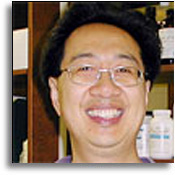 |
 |
|
|
 |
||
| Annual Report | ||
 |
News | |
| MDRC Administration | ||
 |
Directory / Bottin | |
 |
Contact Us | |
 |
Directions / Maps | |
 |
Steering Committee | |
| Research | ||
 |
Events & Seminars | |
 |
MDRC at the forefront | |
 |
McGarry Lecture | |
 |
Cahill Lecture | |
 |
MDRC Core Facilities | |
 |
Scientific Links | |
 |
Education & Employment | |
| Funding | ||
 |
MDRC Grants | |
 |
Donations | |
 |
Non-Profit & Industrial Partners | |
| Medical Information | ||
 |
JDRF | |
 |
CDA | |
 |
Diabetes Quebec | |
 |
ADA | |
 |
IDF | |
 |
NIH / NIDDK | |
 |
Alfediam | |
 |
EASD | |
| Home / About Us > Dr Simon Wing | 
Contact info Dr Simon Wing Tel: 1-514-398-4101
Research keywords
|
|
Simon Wing, MD
Professor of Medicine
Biographical Sketch
Simon Wing obtained his MD degree from McGill University. Following residency training in internal medicine at the Royal Victoria Hospital and in endocrinology at McGill University teaching hospitals, he undertook research fellowships with Dr Alfred Goldberg at Harvard Medical School in the area of hormonal regulation of muscle proteolysis and with Drs Denis Banville and David Thomas at the National Research Council of Canada Biotechnology Research Institute in the area of molecular cloning of ubiquitin conjugating enzymes. He subsequently returned to McGill University and the McGill University Health Centre Research Institute as an assistant professor in the Polypeptide Laboratory of the Department of Medicine. There he has explored the roles of enzymes that modulate ubiquitination in the processes of muscle protein catabolism and in the developmental process of spermatogenesis using biochemical, cellular and transgenic approaches. This work has resulted in characterization of several ubiquitin conjugating enzymes, ubiquitin protein ligases and deubiquitinating enzymes. In 2003, he was appointed Director of the Division of Endocrinology and Metabolism in the Department of Medicine at McGill University and the McGill University Health Centre. Dr Wing is presently a full professor and has been the recipient of a Clinician Scientist Award from the Medical Research Council of Canada, a Chercheur National Award from the Fonds de la recherche en sant� du Qu�bec and has been elected to the American Society for Clinical Investigation. Selected Scientific Contributions
Dr Wing with Dr Goldberg provided the earliest evidence implicating a role for the ubiquitin-proteasome pathway in the activation of proteolysis in skeletal muscle in response to insulin deprivation. He subsequently was the first to clone several of the major mammalian ubiquitin conjugating enzymes. More recently he has identified LASU1 as a large ubiquitin protein ligase that is implicated in regulating spermatogenesis and apoptosis. Currently his laboratory is focused mostly on the role of deubiquitinating enzymes. He has characterized the USP2 deubiquitinating enzyme, revealing a very broad specificity for its catalytic domain such that it is now widely used as a reagent for in vitro deubiquitination of proteins. He has also demonstrated that the USP19 deubiquitinating enzyme can modulate cell growth by indirectly modulating the stability of the cyclin dependent kinase inhibitor p27. Research Interests
Current projects in the laboratory are focused on the functions of deubiquitinating enzymes with particular emphasis on the roles of the USP2 isoforms in spermatogenesis and the roles of the USP19 deubiquitinating enzyme in regulating cell growth and muscle protein degradation. Studies employ transgenic mouse models, cellular assays and biochemical studies. |
|
| � Montreal Diabetes Research Center 2018 |
| Home / About Us News Directory / Bottin Contact Us |